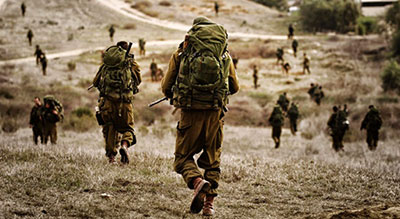War Scenarios That Will not Take Place

Nabil Haitham
Diplomatic circles are currently busy monitoring ‘Israel's' behavior, which recently involved an aerial attack on Syria as well as talk about war scenarios on the "northern front" with Lebanon under the pretext of the growing military capabilities of "Hezbollah".

According to a diplomatic reading of ‘Israel's' domestic scene, this escalatory behavior was unveiled after the meeting between ‘Israeli' Prime Minister Benjamin Netanyahu and US President Donald Trump in Washington.
The escalation gradually started from the political mourning over the demise of the two-state solution to the renewal of threats against the Gaza Strip. Then came the leaking of possible and unconventional war scenarios against "Hezbollah" and threats to destroy the institutions and vital facilities of the Lebanese state, culminating in the air raids inside Syria and dealing a blow to the Syrian air defenses.
This escalation, noted by diplomatic readings, is linked to ‘Israel's' concerns over the changes in Syria following the successes of the Syrian army and its allies on the battlefield. Perhaps the most genuine expression of these fears is the air raid carried out by ‘Israeli' warplanes last week against Syrian military positions near Palmyra.
This raid is highly significant. ‘Israeli' incursions into Syrian territory have always been limited to specific targets, particularly linked to what ‘Israel' claims are arms smuggling operations to "Hezbollah" either along the Beirut-Damascus highway or in Quneitra - adjacent to the occupied Golan and the Lebanese border in western Qalamoun. But the last raid struck deep inside Syria - more specifically the city of Palmyra - where Russian forces are fighting alongside the Syrian government against "Daesh".
Some explain the raid in the context of ‘Israel's' support for the terrorist groups. But diplomatic readings point to an ‘Israeli' message to the Russians after Netanyahu's visit to Moscow, warning the Kremlin of the "danger" - as Netanyahu puts it - of Syria turning into an Iranian base. Netanyahu's warnings were apparently met with a cold shoulder in Moscow. Meanwhile, the positions of Russian officials were warm toward Iran and "Hezbollah" as the two sides were fighting terrorism in Syria.
The meeting between Trump and Netanyahu seems to have injected the latter with a dose of steroids according to the diplomatic reading, so Netanyahu started threatening. The raid on Palmyra came in this context and Netanyahu provided reasons to declare that ‘Israel' targeted a shipment of "sophisticated" weapons on its way to "Hezbollah". Equating it to a threat, he warned that the air raids would continue without regard for the warnings ‘Israel' received from more than one international body.
Similarly, some ‘Israeli' military and political circles announced that "Hezbollah" is the main threat to the "existence of ‘Israel'" and threatened to destroy Syrian air defense systems.
Based on the above, the diplomatic reading expressed fear that ‘Israel' would seek - in the wake of the developments on the Syrian arena and its definite transformation - to ignite the sparks of war in the region, manifested through the raid on Palmyra and the escalation of a maritime dispute with Lebanon. As revealed by "Yedioth Ahronoth" newspaper, ‘Israel's' political leadership is moving toward proposing a draft law to the Knesset regarding the maritime economic border with Lebanon and the inclusion of the disputed area with its northern neighbor.
Here, the political reading reduces the chances of war with Lebanon for one main reason, that ‘Israel' - based on its experiences with Lebanon - is seeking a quick war that achieves a quick victory. But this may not be available to it on the Lebanese front. It knows that a war against Lebanon will not be a walk in the park. It is natural that the Lebanese border stretching along the Syrian frontier to the south maintains a state of alertness and readiness to face any emergency, either by the Lebanese army or "Hezbollah", whose Secretary General Sayed Hassan Nasrallah added to the equation of resistance on land, resistance on the sea, titled: gas for gas, oil for oil, and platform for platform.
It is a constant equation and ‘Israel' knows that. More than that, it recognizes the growing capabilities of "Hezbollah" in the years following the July 2006 aggression. In addition, all of its political, military and security circles are still carefully examining the content of Nasrallah's speech on the occasion of Martyred Leaders Day in mid-February.
Diplomatic readings conclude that Lebanon possesses the power to deter war, which ‘Israel' may not be willing to undertake if there is a risk of it leading to failure. This means that the escalation in Syria may be ‘Israel's' preferred option and the recent ‘Israeli' incursions are part of this context. But here the question arises: What is next after the Syrians publically revealed the qualitative change in the rules of engagement?
Diplomatic readings note the American silence regarding the ‘Israeli' escalation. But it also notices Russia, which is the most powerful player in Syria. The Russian response was not reassuring for the ‘Israeli's. The Russian Foreign Ministry summoned the ‘Israeli' ambassador to Moscow for clarification about the raid, and then warned ‘Israel' through Russian Foreign Minister Sergei Lavrov. Before that there was a belief amongst international military and intelligence circles that the downing of the ‘Israeli' aircraft in Syrian airspace came practically from the Russians. Perhaps this development is what caused the ‘Israeli' madness and still does.
The reading concludes with certainty that the ‘Israeli' escalatory scenarios are scenarios of war that will not take place. And if Tel Aviv is willing to launch a war against Lebanon, this desire stands at the limits of its inability to win and achieve its objectives. On the Syrian side, they certainly want it, because the winds on the Syrian battlefield point to a victory for Bashar al-Assad, "Hezbollah" and Iran, which carries future risks for the ‘Israelis'.
But the main inhibitor to such a war is that the Russians are on Syrian soil, and any ‘Israeli' war against Syria is totally rejected by Moscow, rather it is forbidden.
Source: Al-Jomhouriya Newspaper
Comments




